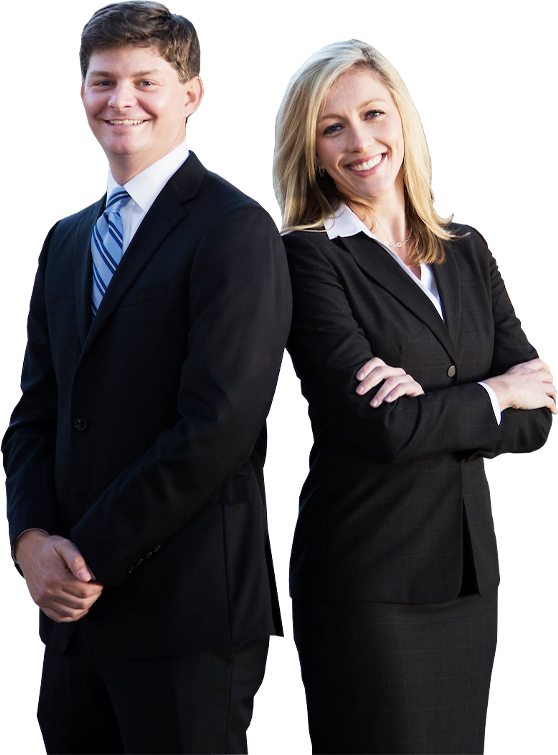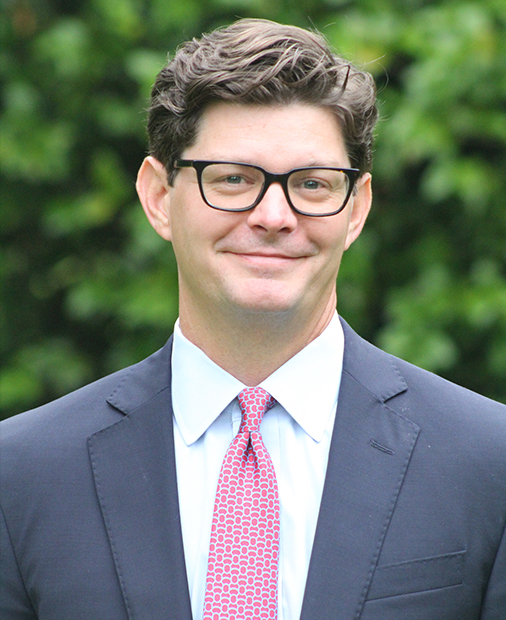Online Trademark Attorneys
Trademark Attorney Working With Clients in San Diego, CA
If you're an entrepreneur, you know that protecting your intellectual property should be high on your list when it comes to safeguarding your company. However, as a successful business owner, you also know the steps and costs of filing a trademark in the U.S. can be expensive and arduous.
This conundrum can be even more overwhelming for new business owners who want to do everything possible to minimize the price of securing trademarks. They try to handle complicated tasks like trademark registration on their own, which can be a big mistake - especially when juggling the day-to-day tasks of running a business. You may be thinking, "But what about those set-it-and-forget-it services you can find online? All you have to do is plug in your info, and you're done." Using pre-made templates for trademark filing can be tempting, but doing so can leave you with inadequate protection and hurt you in the long run.
So, what is the easiest, most cost-effective route to consider that also minimizes legal risk? The truth is, before you spend money on an online filing service, it's best to consult with a trademark attorney working with clients in San Diego, CA.
At Sausser Summers, PC, our experienced trademark attorneys can help you understand the trademark process step by step. We can even help with U.S. trademark filing, U.S. trademark responses, and U.S. trademark renewals at a price you can actually afford. That way, you can make an informed decision regarding your business without having to break the bank.
Resources
Sausser Summers, PC: Simplifying the U.S. Trademark Process
Hiring an attorney can be a daunting task, but at Sausser Summers, PC, our goal is to make the process as simple and seamless as possible for you. That's why we offer a straightforward checkout service. First, you choose your flat fee trademark service and fill out a short questionnaire. Then, we will contact you within 24 hours to discuss the details of our service. From there, one of our experienced trademark attorneys will get to work on your behalf.
Using a trademark attorney for filing in San Diego, CA, can significantly increase your chances of a successful registration. The U.S. government recommends hiring a trademark attorney to help with your application, and our team of trademark lawyers is dedicated to meeting your needs. In fact, we help ensure your application is filed correctly the first time so you can get on with your life and avoid legal risks.
At Sausser Summers, PC, we work closely with our clients to understand their needs and provide them with sound professional advice. We never offer incomplete services, such as simply filing for registration, because that would leave you open to legal risks. You can rely on us to handle your intellectual property matters, and our flat fee services can help protect your business in a simple, straightforward, and affordable way. It's really that simple.
In terms of filing a U.S. trademark, we provide an easy three-step process to protect your intellectual property:
1. You provide your trademark info to our team via an online form.
2. Our team performs a comprehensive trademark search. This search ensures that no other marks will prevent you from registering your trademark in the U.S. Once performed, we'll send you a legal opinion letter that details our findings.
3. Sausser Summers, PC, files your U.S. trademark application. We are then listed as your Attorney of Record on file. From there, we'll provide ongoing updates regarding the status of your trademark as it works through the registration process.
The bottom line? At Sausser Summers, PC, we give both new and seasoned business owners an easy, efficient, cost-effective way to protect the one asset that sets them apart from others: their name.

The bottom line?
At Sausser Summers, PC, we give both new and seasoned business owners an easy, efficient, cost-effective way to protect the one asset that sets them apart from others: their name.
Do I Really Need a Trademark Attorney for Protecting My Business in San Diego, CA?
It's not necessary to be a lawyer in order to apply for a trademark. Anyone can submit a trademark application to the U.S. Patent and Trademark Office (USPTO). However, registering a trademark involves more than just filling out a form. It's essential to conduct thorough research, accurately identify and clearly explain your trademark to ensure it receives adequate protection. And even after securing a trademark, you've got to monitor it consistently to make sure it's free from infringement.
The big takeaway here is that it's always a good idea to work with a trademark attorney to protect the intellectual property that you've worked so hard to establish. According to the Wall Street Journal, applicants are approximately 50% more likely to secure their trademark than people who file applications on their own. If your trademark application is rejected by the USPTO, you will need to revise and refile it, incurring additional filing fees. To avoid delays and extra costs, it is best to have a trademark lawyer help you get it right the first time.
Additional Benefits of Using a Trademark Attorney
Great trademark attorneys (like those you'll find at Sausser Summers, PC) will help with every step of filing and enforcing your trademark. Some additional benefits include the following:
Check to see if your proposed trademark is registered by another entity.
Conduct research to see if another business is using the trademark for which you're applying.
Provide advice and guidance on the strength of your trademark.
Draft and submit your trademark applications and application revisions.
Advice and guidance regarding trademark maintenance and protection.
Monitor the market for unauthorized use of your trademark.
Trademark enforcement to protect you against infringement.

Curious whether our trademark attorney services are right for you and your business? Contact Sausser Summer, PC, today. Let's talk about what you need, and how we can help.
What About Online Filing Services?
Online services, can provide you with basic assistance in filing your trademark. However, they will never be a legitimate substitute for an experienced trademark attorney helping clients in San Diego, CA.

Although online filing services offer a step-by-step process, they take a one-size-fits-all approach to preparing legal documents. Even their advanced service only provides basic attorney assistance in completing your paperwork and helping with minor roadblocks. Online filing services' disclaimer highlights the many limitations of its services, including the fact that communications are not protected by attorney-client privilege. In addition, online filing services cannot provide advice, explanations, opinions, recommendations, or any kind of legal guidance on possible legal rights, remedies, defenses, options, selection of forms or strategies.
In other words, online filing services can offer you the necessary forms and point you in the right direction, but they cannot customize their services to your specific needs or help you with serious complications that may arise.
For the most comprehensive trademark service and protection, it's always wise to work with highly rated trademark lawyers, like you'll find at Sausser Summers, PC.
Understanding Trademarks Over Time
Trademarks in the U.S. can last indefinitely, but did you know that clients in San Diego, CA can file a trademark online, only to lose protection in some circumstances? Trademarks differ from patents and copyrights in that they do not have an expiration date. However, to prevent the cancellation of a trademark, you must maintain it. To ensure that your trademark remains protected, you must actively use it in commerce and renew it with the USPTO every ten years.
The Lanham Act tells us that "use in commerce" is the legitimate use of a trademark in the ordinary course of trade. In other words, you cannot register a trademark solely to reserve the rights to it in the future. In most cases, a trademark must be used continuously in connection with the goods or services it is registered for.

Steps to Renew Your Trademark
Trademarks are registered with the USPTO and generally need to be renewed every ten years. However, there is one crucial exception that you should be aware of. Within the first ten years of owning a trademark, you must file for renewal between the fifth and sixth year from the date of your initial registration.
During this renewal period, you are required to submit a Section 8 declaration, a specimen that shows how the mark is being used, and pay the required fee. You can also apply for Section 15 Incontestability status, which can strengthen your trademark rights. This application, although not mandatory, can make it harder for others to challenge your ownership of the mark.
After the first renewal, which falls between the fifth and sixth year of ownership, the next renewal filing is due between the ninth and tenth year, and then every tenth year thereafter. In the ninth year you will need to file a Section 8 declaration, attesting to your use of the mark or excusable nonuse. You've also got to file a Section 9 renewal application before the end of the tenth year to keep your registration active.
It is worth noting that the USPTO provides a six-month grace period if you fail to renew your mark within the required time frame, but it is best not to rely on it. If you don't file within the grace period time limits, the USPTO will cancel and expire your mark.
By hiring trademark attorneys helping clients in San Diego, CA, you can avoid the pitfalls and mistakes that can arise and cause you to lose your rights to the mark that represents it.
Losing Your Trademark Rights Through Abandonment
In the event that you stop using your trademark and have no plans to resume using it in commerce, it may be considered abandoned by the USPTO. This could result in the loss of your protective rights to the mark. Typically, a trademark is assumed to be abandoned if it has not been used for three years. However, you may be able to refute this presumption by providing evidence that you intend to use the mark again in the future.
Losing Your Trademark Rights Through Inappropriate Licensing
In addition to trademark abandonment, you should also be wary of improper licensing. It's important to remember that once you allow someone else to use your trademark, you must keep an eye on how they use it. You should monitor the products or services that feature your trademark to ensure that they meet consumers' expectations in terms of quality. Failure to do so can lead to a "naked" trademark license and the loss of your protective trademark rights.
How to Avoid Having to Refile Your Trademark
If you're wondering how you can avoid refiling your trademark, the answer is simple: file it correctly the first time around. Filing a trademark isn't inherently difficult, but when doing so, it's very important that certain aspects are filled out accurately in your application. If any information is missing or incorrect, the trademark application may be considered "void ab initio" or void from the beginning, requiring you to file again.
To avoid this, make sure that the information you provide in the application is accurate and complete, including the ownership of the trademark. For instance, if a corporation has multiple shareholders, it should not file under the President's personal name. The rightful owner should be the one/entity that ultimately controls the trademark and the associated goods/services.
It is also important to ensure that the goods and/or services description is precise. For example, if you sell electronic products, you should not file for research and development services despite having a research and development department. The goods/services description should reflect the goods/services you offer to customers, not the departments within your business.
Additionally, providing accurate dates of first use when filing for a trademark is crucial. The USPTO requires two dates to be specified - the date of first use anywhere and the date of first use in interstate commerce. Contact our trademark law office today to learn more about having accurate dates on your filing paperwork.


What Makes an Online Trademark Attorney Great?
At Sausser Summers, PC, we often get questions about how to distinguish run-of-the-mill consultants and others from great trademark attorneys. After all - when you're looking for an attorney to file or prosecute your business trademark, you should know their qualifications. Here are three ways you can separate the proverbial wheat from the chaff when it comes to trademark attorneys.
It's crucial to seek legal advice from a licensed trademark lawyer rather than relying on advice from non-professionals like trademark consultants. The USPTO even recommends hiring an attorney to help with the trademark process. Although trademark consultants may provide advice on trademark availability or name marketability, they cannot file the trademark for you or offer legal advice. According to the Rules of Practicing in trademark cases, "Individuals who are not attorneys are not recognized to practice before the Office in trademark matters." This rule applies to individuals who assist trademark applicants.
When searching for a trademark attorney, it's important to find someone with a strong background in trademark law. Look for an attorney who specializes in this area and has significant experience handling trademark-related cases. Avoid lawyers who don't have expertise in this field, as they may not be able to provide the guidance and support you need.
Ensure your attorney provides updates throughout the trademark registration process to avoid missing deadlines, including responding to any Office actions within six months. Failure to do so can result in trademark abandonment. The USPTO will only correspond with the listed attorney of record, so make sure your attorney keeps you informed.
In summary:
- Be sure you're using a licensed trademark attorney helping clients in San Diego, CA.
- It's best to work with a trademark lawyer who has years of experience filing trademarks.
- Ensure that your trademark lawyer is willing to provide ongoing notifications relating to your trademark application process.

Trademark Attorneys Working Hard for You
Building your brand and gaining recognition for it is a significant achievement, and it's important to protect it. However, there are certain pitfalls and mistakes that can arise, causing you to lose your rights to the mark that represents it. By working with knowledgeable trademark attorneys, you can avoid these issues and file your trademark successfully.
With an A+ rating from the Better Business Bureau (BBB), Sausser Summers, PC, offers comprehensive guidance, strategic advice, and reliable representation for a variety of trademark matters. Our attorneys have years of real-world experience and, having registered countless trademarks with the USPTO, provide our clients with individualized representation when they need it most.
If you're looking for skilled, adept, and experienced counsel, look no further than our trademark law firm. Contact us today to schedule your initial consultation and learn how we can help you safeguard your brand.
Latest News in San Diego, CA
Opinion: Health risks from oil wells in California must be reined in. Voters can do so this fall.
Vi Nguyenhttps://www.sandiegouniontribune.com/opinion/commentary/story/2024-04-16/opinion-black-and-latinx-communities-in-california-are-at-much-higher-health-risks-heres-what-needs-to-change
Nguyen, M.D., is chair of the American Academy of Pediatrics California Expert Committee on Climate Change and Environmental Health, and co-founder of San Diego Pediatricians for Clean Air. She lives in San Diego. Rhodes is a premed advocacy intern for the American Academy of Pediatrics California Committee on Environmental Health and lives in San Diego.California is often billed as a national leader on environmental legislation to cut greenhouse gas emissions. This is true, which is why it ca...
Nguyen, M.D., is chair of the American Academy of Pediatrics California Expert Committee on Climate Change and Environmental Health, and co-founder of San Diego Pediatricians for Clean Air. She lives in San Diego. Rhodes is a premed advocacy intern for the American Academy of Pediatrics California Committee on Environmental Health and lives in San Diego.
California is often billed as a national leader on environmental legislation to cut greenhouse gas emissions. This is true, which is why it can be easy to forget that we are also a major oil-producing state. The fossil fuels industry has large interests in oil wells in California — both those existing and the ability to add more. While greenhouse gases are a concern related to this industry, petrochemical byproducts are also very hazardous to human health. Today even populated areas are often targeted for oil drilling, which makes safety standards a necessity to keep oil wells a minimum safe distance from sensitive populations. Senate Bill 1137 — signed by Gov. Gavin Newsom in 2022 — would have provided just that: meaningful safety setbacks around oil wells to protect public health. Unfortunately, with the industry’s successful effort to delay SB 1137, California currently has nothing of the sort.
Unlike most oil-producing states, California has somewhat limited regulations on where oil wells can be placed. Hospitals, daycare centers, shopping malls and neighborhoods could all legally have an oil well pumping in their parking lot as far as state law is concerned.
Advertisement
But Senate Bill 1137 would have introduced a 3,200-foot health and safety setback for the permitting of new oil wells or existing well repairs. This means that new oil wells could no longer be constructed in dangerous proximity to populations, and that there would be no permits for the repairs of existing wells in these areas.
The bill would have amounted to the phase-out of all oil drilling in unsafe areas in California, protecting countless Californians from pollution around oil wells and related health impacts. Senate Bill 1137 was passed in August 2022, but the oil industry spent millions of dollars on lobbying to delay the bill and put it to a referendum for voters to approve. In November, Californians will determine the fate of Senate Bill 1137 via the California Oil and Gas Well Regulations Referendum and must decide whether they want this important protection.
Oil wells emit numerous air pollutants which can seriously impact people nearby. A 14-year Stanford research project found elevated levels of toxic particulate matter (PM 2.5), volatile organic compounds, ozone, nitrous oxide and carbon monoxide within a 2.5-mile radius of oil wells in California. Taken together, these can cause respiratory infections, asthma, preterm birth and heart disease. Additionally, the Environmental Protection Agency warns of air toxics emitted by the industry, including benzene, ethylbenzene and n-hexane. These are all known or strongly suspected of being linked to cancer and other serious health hazards. While the 3,200-foot safety setback might seem ambitious, it was recommended as a minimum by an independent council of experts. In 2021, the California Oil and Gas Public Health Rulemaking Scientific Advisory Panel told California officials that 1 kilometer — a little more than 3,200 feet — is the minimum distance to establish between oil wells and sensitive populations in order to protect public health.
The most important consideration for Senate Bill1137 may be the protection of children in our state. Children are at increased risk from all the pollutants found near oil wells, simply because their metabolisms require them to take in much more air and water — and, thus, pollutants relative to their body weights — than adults. Their developing bodies and brains can also be affected by these air pollutants differently than adults, resulting in behavioral problems that can impact their performance in school. These risks are not spread equally; like so many geographic determinants of health, Black and Latinx communities in California are at much higher risk of exposure to oil wells. Fundamentally, Senate Bill 1137 is a matter of social justice. It could safeguard the health and futures of the most vulnerable Californians. At the American Academy of Pediatrics California, we encourage you to go out on Nov. 5 and vote to “keep the law” and uphold Senate Bill 1137!
San Diego Zoo Safari Park welcomes 250th California condor chick
Caitlin McCaffertyhttps://www.dvm360.com/view/san-diego-zoo-safari-park-welcomes-250th-california-condor-chick
The San Diego Wildlife Alliance announced it welcomed Emaay, the 250th California condor chick at the San Diego Zoo Safari Park. Emaay’s name comes from the Kumeya word for sky. The mother is MexWe and the father is Xol-Xol, the first California condor brought into human care under the California Condor Recovery Program in 1982.According to an organizational release, the egg was placed in an incubator before hatching to be monitored by the wildlife care team.1 The team began to suspect malposition and brought the egg ...
The San Diego Wildlife Alliance announced it welcomed Emaay, the 250th California condor chick at the San Diego Zoo Safari Park. Emaay’s name comes from the Kumeya word for sky. The mother is MexWe and the father is Xol-Xol, the first California condor brought into human care under the California Condor Recovery Program in 1982.
According to an organizational release, the egg was placed in an incubator before hatching to be monitored by the wildlife care team.1 The team began to suspect malposition and brought the egg to the Paul Hater Veterinary Medical Center for a CT, which determined the chick’s position was not a concern. The chick successfully pipped and was brought back to the parents for hatching. The nest for the family is equipped with an infrared camera so the team can monitor the hatching process 24/7. The San Diego Wildlife Alliance welcomed Emaay in the early hours of March 16, and their gender has not been determined yet. Emaay is doing well under the care of their very attentive parents, according to the release.
"Reaching this milestone feels incredible," said Nora Willis, senior wildlife care specialist, at San Diego Zoo Wildlife Alliance, in the release.1 "Seeing the success that the San Diego Zoo Safari Park has had—and the success of the California Condor Recovery Program as a whole—is inspiring. There's still a long way to go but being part of this and helping the species recover is life-changing."
The California condor egg receiving a CT at the Paul Hater Veterinary Medical Center (Image courtesy of San Diego Zoo Safari Park)
Xol-Xol was rescued from the Sespe Condor Sanctuary at 3 months old after being neglected by his parents. He was then brought to the San Diego Zoo Safari Park, making him the first California condor to be brought into human care under the California Condor Recovery Program in 1982. Now, Xol-Xol fathered 41 chicks in 1993 and many have been reintroduced into their native habitat. In 2025, Emaay is expected to join the native population.
The San Diego Zoo has a long history of helping the California condor. In 1929, the zoo received its first California condor after a couple found it with a damaged wing in Ventura, California.2 Although the bird had to have its wing amputated, it has been active and healthy for over 10 years The US Fish and Wild Service and the California Department of Fish and Game gave the San Diego Wildlife Alliance permission to begin the first zoological propagation program for these birds when there was only 22 left in the world.
In 1983, the San Diego Zoo received its first condor egg after it was moved from the wilderness into human care for artificial incubation. Sisquoc was then the first California Condor to ever hatch in a zoo on March 30, 1983.2 Now at least 50 California condors have rejoined their native habitat with 12-15 condors hatched in the habitat every year. The condors hatched in human care are reintroduced in the United States across 5 reintroduction sites: 1 in northern Arizona at the Vermillion Cliffs and 4 in California, including Ventana Wilderness in Big Sur, Pinnacles National Monument, Yurok Ancestral Territory, and Redwood National Park, and the Bitter Creek National Wildlife Refuge in the Los Padres National Forest.1
References
Tax Deadline Extended for San Diegans Following January Storms
State of Californiahttps://news.caloes.ca.gov/tax-deadline-extended-for-san-diegans-following-january-storms/
Extended deadlines to file and pay taxes may be available for individuals, families and businesses who live in San Diego County. Continuing to support Californians as they recover from recent storms, the Internal Revenue Service (IRS) approved a request from Governor Gavin Newsom, the California Governor’s Office of Emergency Services (Cal OES) and the California Franchise Tax Board (FTB) to extend tax deadlines for California taxpayers in San Diego County to June 17, 2024.These extensions come following a ...
Extended deadlines to file and pay taxes may be available for individuals, families and businesses who live in San Diego County.
Continuing to support Californians as they recover from recent storms, the Internal Revenue Service (IRS) approved a request from Governor Gavin Newsom, the California Governor’s Office of Emergency Services (Cal OES) and the California Franchise Tax Board (FTB) to extend tax deadlines for California taxpayers in San Diego County to June 17, 2024.
These extensions come following a Presidential Major Disaster Declaration announced on February 19, 2024.
Taxpayers should consult a tax professional for complete details.
Tax relief for disasters
The Internal Revenue Service (IRS) and Franchise Tax Board (FTB) may grant individuals and businesses additional time to file or pay when a major disaster in their area is declared by the federal or state government. California generally follows the IRS extended deadlines to file and pay taxes. Impacted taxpayers may also be eligible to claim a disaster loss on their tax return.
Affected individuals and businesses in San Diego County now have until June 17 to file their tax returns and pay federal and state taxes due between January 21 through June 17, 2024. Payments due on June 17 remain due on that date. This extension to file and pay includes the following:
For any given Emergency Measure or Major Disaster Declaration that triggers IRS tax relief/postponement in California, the State will evaluate any filing or payment postponement in response to each declaration or emergency on a case-by-case basis, consistent with existing authority per Revenue and Taxation Code section 18572.
Taxpayers affected by a presidentially declared disaster may claim a deduction for a disaster loss. Additional information and instructions are available in FTB Publication 1034, Disaster Loss: How to Claim a State Tax Deduction.
Taxpayers can claim a disaster loss in one of two ways. They may claim the disaster loss for the 2024 tax year when they file their return next spring, or they may claim the loss against 2023 income on this year’s return. An amended return may be filed by those who already have filed this year. The advantage of claiming the disaster loss on a tax year 2023 return is that FTB can issue a refund sooner.
If an affected taxpayer receives a late filing or late payment penalty notice related to the postponement period, the taxpayer should call the number on the notice to have the penalty abated.
Disaster victims also may receive free copies of their state returns to replace those lost or damaged. Taxpayers may complete form FTB 3516 and write the name of the disaster in blue or black ink at the top of the request.
FTB notes the following existing statutory provisions that could provide additional relief to taxpayers automatically or upon request and based on their facts and circumstances:
Additional information on these items above can be found on FTB’s website.
Additional Information
San Diego mayor to pay $10,500 fine for not disclosing donations he solicited, including to his nonprofit
Jeff McDonaldhttps://www.sandiegouniontribune.com/news/watchdog/story/2024-04-16/gloria-fined-over-10k-for-failing-to-disclose-donations-to-charity-that-supports-mayors-office
One of the lesser-known privileges of being an elected official in California is the right to ask corporations and wealthy individuals to make donations to one’s favorite charities.The contributions, which are known as behested payments, can come in the form of cash or in-kind donations. They are used to raise millions of dollars from special interests that benefit tax-exempt organizations.As part of the system of che...
One of the lesser-known privileges of being an elected official in California is the right to ask corporations and wealthy individuals to make donations to one’s favorite charities.
The contributions, which are known as behested payments, can come in the form of cash or in-kind donations. They are used to raise millions of dollars from special interests that benefit tax-exempt organizations.
As part of the system of checks and balances, elected officials must publicly disclose payments made at their behest within 30 days, once they exceed $5,000 in any 12-month period.
Advertisement
San Diego Mayor Todd Gloria acknowledged in a public filing last week that he repeatedly violated the law by not reporting a series of contributions made to charities by outside donors at his behest.
According to the San Diego Ethics Commission, Gloria failed to properly report 10 separate contributions he solicited from private contributors — many of whom donated to For All of Us, the charity he helped set up in early 2021 to support his favored causes.
“Respondent violated (San Diego Municipal Code) by failing to timely file Forms 803 to disclose behested payments,” the agreement dated April 11 says.
Gloria agreed to pay a $10,500 fine to resolve the case.
The stipulation shows that the ethics investigation was opened shortly after The San Diego Union-Tribune asked the mayor’s office about tens of thousands of dollars Gloria raised and spent on behalf of For All of Us, the tax-exempt entity named after his 2020 campaign slogan.
May 30, 2023
According to the Ethics Commission, Gloria disclosed tens of thousands of dollars in behested payments beginning days after the Union-Tribune first asked his office about the charity.
Most of those donations were reported hundreds of days late, including over $5,700 that For All of Us paid to cater a thank-you event to Gloria. That disclosure was 679 days overdue. The charity also had failed to report almost $6,000 in spending for a back-to-school event and supplies.
An aide to Gloria said the mayor self-reported the payments beginning last May, after the Union-Tribune raised questions about the contributions.
“Upon discovering these regrettable oversights, our office immediately filed the necessary documentation,” mayoral spokesperson Rachel Laing said by email.
“Our staff has undergone multiple trainings to recognize when behested payment filings might be required in order to be in full compliance in the future,” she added.
June 15, 2023
Gloria served two terms on the City Council and two terms in the state Assembly before becoming mayor and therefore has been obliged to file Forms 803 for more than 15 years.
In all, Gloria and For All of Us did not properly report some $65,000 in donations and spending as required.
Besides the monetary penalty, the mayor also agreed to “take necessary and prudent precautions to ensure compliance with all provisions of the Ethics Ordinance in the future.”
The $10,500 fine is one of the larger sanctions issued by the ethics panel.
Supporters of behested payments say the rules allow elected officials to generate revenue for needy community groups that might not otherwise receive public support.
Critics of the practice complain that the solicitations are a way for special interests to curry favor with politicians in order to help gain support for permit applications, development plans or other policy objectives.
Gloria is not the only local elected official to have helped establish a charity to benefit his office‘s work.
Former Mayor Kevin Faulconer famously raised millions of dollars from corporations and wealthy donors for local nonprofit organizations, including one he established after first winning election in 2014.
May 30, 2023
The entity Faulconer called One San Diego adopted a mission statement that included the legal ability to pay for virtually anything the mayor saw fit, including political polling, receptions, office furniture and other expenses.
“The corporation will be closely related to the city of San Diego, insofar as one of the corporation’s purposes is to relieve the city of costs and burden of conducting activities on behalf of the Office of the Mayor,” the One San Diego founding documents said.
One San Diego folded as an entity weeks after Faulconer vacated the Mayor’s Office due to term limits.
Other local elected officials have raised money for local charities from donors without setting up a specific charity to direct the spending.
San Diego City Attorney Mara Elliott reported a $100,000 behested payment last year from the Golden Door spa to the Your Safe Place Foundation, a charity set up to support a program in her own office.
The charity was listed as legally delinquent at the time the donation was made, the Union-Tribune reported.
May 7, 2023
Colin Parent, the La Mesa council member now running for state Assembly, reported hundreds of thousands of dollars in behested payments. Most of that money went to the charity he runs called Circulate San Diego, the Union-Tribune reported last year.
Members of the San Diego City Council and the county Board of Supervisors also have reported soliciting charitable contributions to nonprofit groups whose missions they support.
So did the former district attorney, Bonnie Dumanis, and the former sheriff, Bill Gore. The charity Dumanis had raised money for was unregistered at the time. Gore was named by Gloria to the ethics commission last year before withdrawing his name amid opposition.
Oct. 30, 2023
So far this year, Gloria has reported over $300,000 in behested payments, city clerk’s records show.
Most of those contributions were directed to San Diegans Together Tackling Homelessness, the nonprofit created by the mayor to raise money to fund services for unhoused people.
No other San Diego city officials have reported behested payments in more than two years.
San Diego federal lawsuit challenges law banning most non-California residents from carrying guns
Alex Rigginshttps://www.sandiegouniontribune.com/news/courts/story/2024-04-13/san-diego-nonresident-gun-lawsuit
The suit claims the law is unconstitutional and bars otherwise law-abiding citizens of other states from exercising their Second Amendment rights in CaliforniaA firearms advocacy group and three people who live in Pennsylvania, Idaho and New Mexico filed a lawsuit Thursday in San Diego federal court challenging a state law that mostly bans non-California residents from carrying guns in the state.The lawsuit alleges that the regulation violates the Second Amendment and 14th Amendment and should be overturned. It claims the law...
The suit claims the law is unconstitutional and bars otherwise law-abiding citizens of other states from exercising their Second Amendment rights in California
A firearms advocacy group and three people who live in Pennsylvania, Idaho and New Mexico filed a lawsuit Thursday in San Diego federal court challenging a state law that mostly bans non-California residents from carrying guns in the state.
The lawsuit alleges that the regulation violates the Second Amendment and 14th Amendment and should be overturned. It claims the law is “unconstitutionally restrictive” and bars the plaintiffs from carrying guns in California even though each have been issued concealed-carry permits in their home states.
“Individuals like Plaintiffs do not lose protection of their rights under the First Amendment’s speech or religion clauses when they cross state lines. Nor do they lose their protections under the Fourth Amendment’s prohibition on unreasonable searches and seizures,” the lawsuit alleges. “They likewise do not surrender their Second Amendment protected rights when they travel outside their home state.”
Advertisement
The office of state Attorney General Rob Bonta, who is the named defendant in the case, did not respond to a request for comment. Bonta’s office has vigorously defended the state’s challenged gun laws and other weapons laws in the past.
March 6, 2023
The lawsuit alleges that the three plaintiffs live out of state and wish to carry firearms when they visit California but are legally barred from doing so. The suit claims that the main exception to the law — for certain people who live out of state but operate a business in California and spend significant time at the business — is so narrow that it’s irrelevant.
Included among the plaintiffs is Christopher Hoffman, a Pittsburgh resident who lived in San Diego County between 1990 and 2012. According to the lawsuit, the San Diego County Sheriff’s Department previously issued Hoffman a concealed-carry weapon, or CCW, license on multiple occasions when he resided in the county.
“Hoffman ... frequently returns to San Diego County to visit family and friends,” the lawsuit states. “Hoffman desires to carry a firearm in public for self-defense while he visits California and would do so if California law permitted him to.”
The suit makes similar claims as to plaintiffs Chad Orrin, a former California resident who now lives in Idaho, and Jennifer Sensiba, a New Mexico resident. All three of the individual plaintiffs are members of the Firearms Policy Coalition, which is also a plaintiff in the suit.
“The right to bear arms doesn’t end at California’s border,” Brandon Combs, founder and president of Firearms Policy Coalition, said in a statement. “We look forward to eliminating this unconstitutional ban and restoring liberty in the Golden State.”
The suit is the latest in a long list of challenges to California’s strict weapons laws filed in San Diego federal court in recent years. Other lawsuits have challenged the state’s bans on assault rifles, large-capacity magazines, frequent gun purchases and switchblades.
San Diego became a favorite venue for such challenges thanks in part to the decisions of U.S. District Judge Roger Benitez, who so frequently ruled in favor of striking down California’s weapons laws that gun enthusiasts gave him the moniker “St. Benitez.” For a time, Second Amendment advocates used a local court rule regarding related cases to get weapons challenges to Benitez’s courtroom even after those cases were initially and randomly assigned to different judges.
The local court amended that rule last year even before so-called judge shopping become a national issue. Last month, the U.S. Judicial Conference issued new guidance aimed at ensuring constitutional cases with nationwide implications be assigned randomly, and this week Senate Majority Leader Chuck Schumer and Senate Minority Leader Mitch McConnell each proposed bills to change how cases are assigned.
The suit challenging California’s non-resident gun ban was randomly assigned to U.S. District Judge Cathy Bencivengo.
Gun rights groups have found success in the courts with various judges over the better part of the past two years stemming from the U.S. Supreme Court’s landmark 2022 decision in New York State Rifle & Pistol Association v. Bruen, which established a new standard for analyzing the legality of weapons restrictions.
Nov. 27, 2022
Courts considering whether modern gun regulations are legal must now make their decisions based on the “Second Amendment’s plain text” and must ensure modern laws are “consistent with the nation’s historical tradition of firearm regulation,” according to the Bruen decision.
Under that analysis, Benitez and other federal judges in San Diego have over the past year overturned California laws banning assault rifles, outlawing billy clubs, imposing background checks for ammunition purchases and banning certain “unsafe” handguns. All of those rulings are under appeal with the 9th U.S. Circuit Court of Appeals.
Disclaimer:

 Sausser Summers, PC
Sausser Summers, PC Call
us (843) 654-0078
Call
us (843) 654-0078